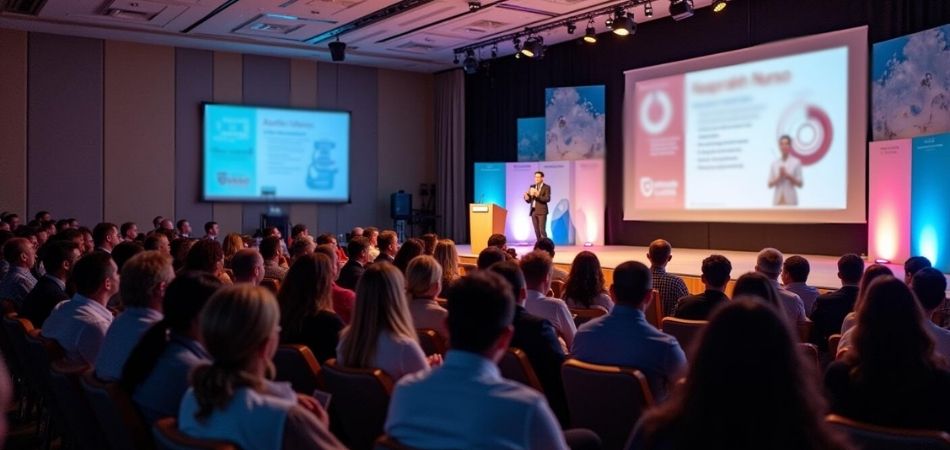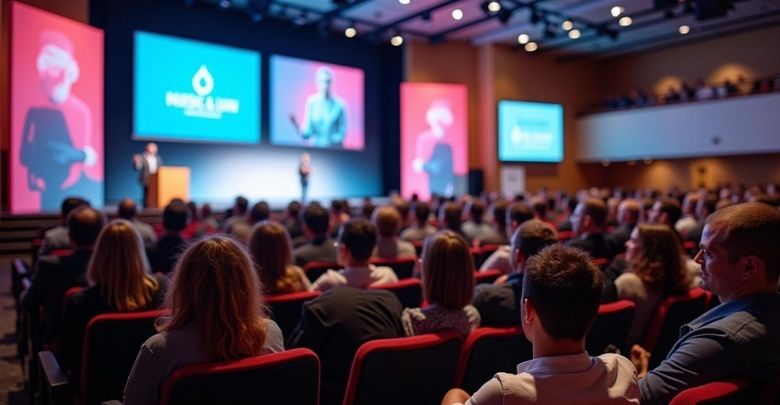Cloud engineering conferences are dynamic gatherings where technology enthusiasts, experts, and innovators converge to explore the future of cloud computing. If you’ve ever wondered, what topics are typically covered in a cloud engineering conference?—you’re not alone. These events are packed with insights, strategies, and breakthroughs that drive the industry forward.
From discussions on cloud security and automation to exploring the latest trends in DevOps, scalability, and artificial intelligence, these conferences dive into topics that address real-world challenges and solutions. Attendees leave with actionable knowledge, tools, and inspiration to drive innovation in their projects and organizations.
Ready to uncover the exciting themes and focus areas shaping these events? Dive into the details to discover what makes cloud engineering conferences truly unmissable!
What Topics Are Typically Covered in a Cloud Engineering Conference?
Cloud engineering conferences are vibrant spaces where technology, innovation, and expertise come together to influence the direction of cloud computing in the future. Whether you’re a seasoned professional or just starting in the field, these events offer invaluable insights into key industry trends. From innovative tools to best practices, the topics discussed are both practical and forward-looking.
Exploring Cloud Security and Compliance
Safeguarding data in the cloud is a priority for organizations worldwide. Discussions in this area often focus on encryption, multi-factor authentication, and proactive strategies to combat security threats. Whether attending a local seminar or a cloud engineering conference in Canada, attendees gain insights into meeting compliance standards and managing risks associated with global regulations like GDPR and HIPAA.
Enhancing Efficiency With DevOps and Automation
The integration of DevOps practices is revolutionizing cloud engineering. Sessions in this domain highlight how automation tools streamline development, testing, and deployment processes. These topics empower teams to collaborate better, improve efficiency, and achieve faster time-to-market with fewer errors.
Scaling Systems for Performance and Reliability
Achieving scalability without compromising reliability is a key challenge in cloud engineering. Conferences address strategies like auto-scaling, dynamic resource allocation, and optimization techniques. These discussions help attendees build robust systems capable of handling fluctuating workloads efficiently.
Building Future-Ready Cloud Architectures
Designing resilient and adaptable cloud systems is a central theme at many conferences. Topics include microservices architecture, containerization, and serverless computing. Participants leave with knowledge of how to create systems that can adapt to changing business needs and technological advancements.
Harnessing AI and Machine Learning
AI and ML are changing how cloud services are utilized. Experts explore ways to integrate these technologies for better data analytics, automation, and user experiences. Attendees often learn about real-world applications and the potential of AI-driven solutions in cloud environments.
Optimizing Costs in Cloud Environments
Managing expenses is essential for businesses using cloud infrastructure. Sessions in this area cover cost management tools, monitoring resource usage, and identifying inefficiencies. This ensures attendees can balance innovation with financial sustainability in their cloud strategies.
Industry-Specific Use Cases and Innovations
Cloud engineering conferences frequently showcase how various industries use cloud technologies. Topics span healthcare, finance, retail, and more, offering personalized solutions and best practices. These insights inspire attendees to adapt ideas to their specific organizational needs.
Building a Collaborative Ecosystem
Beyond technical sessions, these events emphasize collaboration. Networking activities help professionals connect, share challenges, and discuss solutions. Attendees leave not only with knowledge but also with connections that can lead to future innovations.
Cloud engineering conferences are a treasure trove of insights, practical solutions, and inspiration. Whether you’re looking to tackle current challenges or prepare for future innovations, these events are your gateway to unlocking the potential of cloud computing.
Is One Day Enough to Cover Key Topics at a Cloud Engineering Conference?
Cloud engineering conferences are designed to offer in-depth insights into rapidly advancing technologies and practices. While a single day can provide valuable knowledge, it often limits the depth and breadth of coverage. Understanding what can realistically be accomplished in one day is essential for setting expectations and maximizing value.
Focused Sessions Provide Core Insights
In a single-day conference, organizers often prioritize high-impact topics that resonate with a broad audience. Sessions typically focus on foundational subjects such as cloud architecture, security, or automation. Compared to the typical duration of cloud engineering conferences, which often span two or more days, a single day may restrict time for in-depth exploration.
Limited Time for Networking Opportunities
One of the biggest limitations of a one-day event is reduced time for meaningful networking. Attendees may find it challenging to connect with peers, industry leaders, and potential collaborators in such a short timeframe. Networking often flourishes during longer breaks, workshops, or after-event sessions, which are typically limited to a single-day format.
Hands-On Workshops Are Often Skipped or Shortened
Hands-on learning, such as workshops and real-world problem-solving sessions, is one of the most valuable aspects of cloud engineering conferences. However, these activities often require more time than a one-day conference allows. As a result, attendees may miss opportunities to apply concepts or gain practical experience during shorter events.
The Latest Trends and Tools May Be Briefly Touched Upon
In a single day, conferences might only scratch the surface of emerging trends and tools. Topics such as cloud-native development or sustainability practices may be discussed in short sessions without providing actionable insights. A longer event allows for a more comprehensive exploration of these subjects.
While a one-day conference can still be impactful by covering essential topics, it is often best suited for general learning or gaining introductory knowledge. For a deeper dive into specialized areas, multi-day events are more effective. Choosing the right format depends on your learning goals and time availability.
The Role of DevOps and Automation in Cloud Conferences
Cloud conferences are not just about exploring emerging technologies; they also emphasize the tools and practices that improve workflows and efficiency. DevOps and automation have become foundational topics, reflecting their importance in modern cloud strategies. These sessions inspire attendees to optimize their systems and embrace collaborative solutions.
Enhancing Collaboration Through DevOps
DevOps bridges the gap between development and operations teams, fostering seamless collaboration. Cloud conferences often highlight the methodologies that enhance communication, streamline workflows, and reduce bottlenecks in production cycles. By adopting DevOps, organizations can align their teams, minimize errors, and accelerate the delivery of reliable cloud solutions.
Automation for Streamlined Operations
Automation is no longer a luxury but a necessity in cloud computing. Conference sessions focus on how automated tools handle repetitive tasks like deployment, monitoring, and scaling, freeing teams to focus on innovation. These discussions provide actionable insights into using automation to save time, cut costs, and improve overall system efficiency.
Integrating CI/CD Pipelines for Faster Delivery
Continuous Integration and Continuous Deployment (CI/CD) pipelines are critical components of modern DevOps practices. Experts at cloud conferences showcase strategies for creating and optimizing these pipelines to enable frequent, error-free deployments. Participants learn how CI/CD fosters agility and ensures that applications remain up-to-date with minimal disruptions.
DevOps and automation are at the heart of discussions in cloud engineering conferences, empowering organizations to achieve greater efficiency and innovation. By integrating these practices, businesses can not only streamline their processes but also stay ahead in the constantly changing cloud landscape.
Networking and Community Building at Cloud Engineering Conferences
Cloud engineering conferences are more than just technical sessions—they’re vibrant spaces where professionals connect, collaborate, and exchange ideas. Beyond the learning opportunities, these events foster a sense of community among cloud enthusiasts. Building relationships here often leads to long-term collaborations and professional growth.
Creating Valuable Professional Connections
Meeting like-minded professionals is a cornerstone of these events. Networking sessions provide opportunities to interact with engineers, architects, and thought leaders from diverse backgrounds. These connections often spark ideas, solve challenges, and open doors to potential partnerships or mentorship opportunities.
Engaging with Industry Experts
Conferences bring together seasoned professionals who share their insights and experiences. Engaging in discussions with these experts provides fresh perspectives on industry trends and real-world solutions. For example, ideal attendees for cloud engineering conferences, such as architects, DevOps engineers, and IT managers, often gain actionable advice that can significantly impact their projects and career trajectories.
Learning Through Collaborative Problem-Solving
Interactive sessions like workshops and roundtables encourage attendees to collaborate on solving industry-specific challenges. Sharing experiences and brainstorming solutions with peers creates a sense of camaraderie and teamwork. This collective learning fosters innovative approaches to common cloud engineering problems.
Strengthening the Cloud Community
These conferences emphasize the importance of building a supportive and inclusive cloud community. Events often include social gatherings, hackathons, and informal meetups to strengthen bonds among attendees. Such initiatives help create a thriving ecosystem that supports growth and innovation in cloud computing.
Networking and community building at cloud engineering conferences go beyond exchanging business cards—they’re about forming meaningful connections and sharing knowledge. By participating actively, attendees enrich their professional lives while contributing to the growth of a dynamic and collaborative cloud engineering community.
Preparing for Your Next Cloud Engineering Conference: Tips and Takeaways
Attending a cloud engineering conference can be a transformative experience, but preparation is key to making the most of it. From planning your schedule to networking effectively, a bit of foresight goes a long way. Here are some practical tips to ensure you leave the event inspired and informed.
Research the Agenda and Speakers
Before the conference, take time to explore the schedule and list of speakers. Identifying sessions relevant to your interests or challenges ensures you don’t miss out on key insights. Being familiar with the speakers’ backgrounds can also help you prepare thoughtful questions to enhance your learning experience.
Set Clear Goals for Attendance
Having clear objectives helps you focus your efforts during the event. Whether it’s gaining technical knowledge, discovering tools, or expanding your professional network, defining your goals ahead of time is essential. This clarity enables you to prioritize activities and maximize your time.
Engage Actively in Networking Opportunities
Networking is one of the most valuable aspects of any conference. Instead of just exchanging business cards, take the time to have meaningful conversations with peers and experts. Building genuine connections can lead to collaborations and lasting professional relationships beyond the event.
Bring the Right Tools and Resources
Ensure you have essentials like a charged device, notebook, and conference app to stay organized. Digital tools can help you keep track of schedules, notes, and new contacts. Being well-prepared allows you to focus on learning and engaging without logistical distractions.
By taking the time to prepare, you can transform your conference experience into a valuable investment in your professional growth. Approach the event with curiosity, and you’ll walk away with new knowledge, connections, and inspiration to advance your cloud engineering journey.
Frequently Asked Questions
Cloud engineering conferences often spark curiosity among professionals and enthusiasts alike. Below are some frequently asked questions that dig deeper into the broader aspects of these events, helping you understand their impact and relevance beyond the main topics.
Are Cloud Engineering Conferences Suitable For Beginners?
Yes, many cloud engineering conferences cater to beginners through introductory sessions and workshops. These sessions provide foundational knowledge of cloud computing, its architecture, and common tools. They’re a great way to build confidence and network with experts who can offer guidance.
Do Cloud Engineering Conferences Include Hands-On Training?
Absolutely! Hands-on training is a staple feature of many cloud conferences. Participants often get access to live labs, coding sessions, and guided workshops, enabling them to apply concepts in real-time. This approach ensures practical learning and enhances problem-solving skills.
Can Small Businesses Benefit From Cloud Engineering Conferences?
Yes, cloud engineering conferences can be incredibly valuable for small businesses. They offer insights into cost-effective cloud solutions, scalability strategies, and tailored tools for small teams. Business owners can learn to optimize their resources while staying competitive in the tech-driven market.
What Are Some Non-Technical Topics Covered At These Conferences?
Non-technical topics often include leadership strategies, project management, and team collaboration in cloud environments. Speakers address how to align cloud strategies with business goals, making these sessions relevant for managers, executives, and decision-makers.
How Can I Prepare For A Cloud Engineering Conference?
Preparation involves researching the agenda, identifying sessions relevant to your goals, and planning networking opportunities. Bringing questions and an open mind will help you gain the most value. Many conferences also provide mobile apps for seamless navigation and updates.
Conclusive Words
There is more to cloud engineering conferences than just gatherings of professionals—they offer opportunities for learning, collaboration, and innovation. If you’ve been wondering, what topics are typically covered in a cloud engineering conference? the answer is a mix of cutting-edge technology, practical solutions, and future-forward discussions.
From deep dives into cloud security and DevOps to exploring AI’s role in cloud computing, these events provide actionable insights for professionals at all levels. The diverse topics ensure every attendee walks away with valuable knowledge to apply in their work or business.
So, whether you’re a beginner or an experienced engineer, these conferences are worth your time. Ready to upgrade your cloud expertise? Don’t miss the chance to experience the transformative power of a cloud engineering conference!








